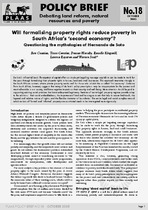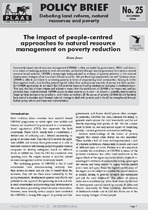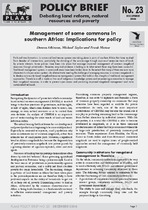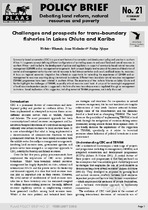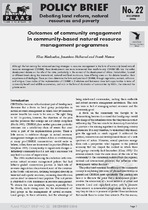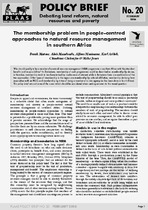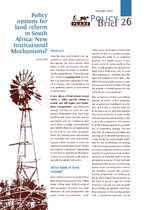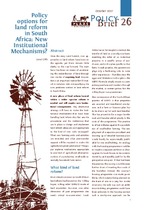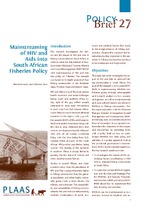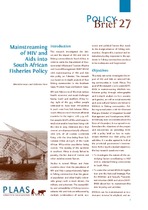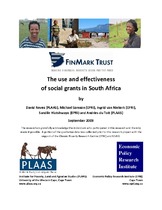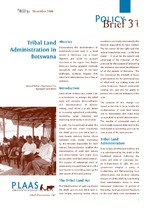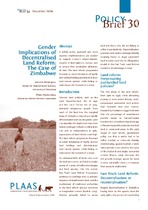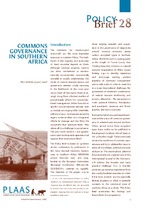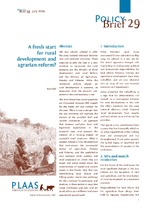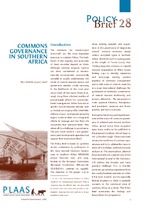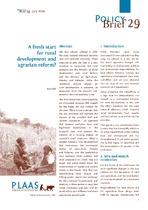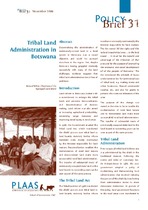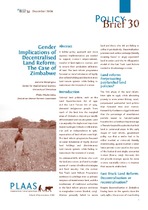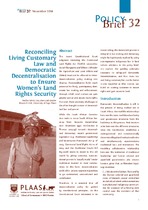Browsing Policy Briefs by Issue Date
Now showing items 21-40 of 144
-
Will formalising property rights reduce poverty in South Africa’s ‘second economy’?
(Institute for Poverty, Land and Agrarian Studies, University of the Western Cape, 2005)De Soto’s influential book The mystery of capital offers a simple yet beguiling message: capitalism can be made to work for the poor, through formalising their property rights in houses, land and small businesses. This ... -
The impact of people-centred approaches to natural resource management on poverty reduction
(Institute for Poverty, Land and Agrarian Studies, University of the Western Cape, 2006)Community-based natural resource management (CBNRM) is often promoted by governments, NGOs and donors as a means of reducing poverty in rural communities, particularly through income-generation from various natural res ... -
Management of some commons in southern Africa: Implications for policy
(Institute for Poverty, Land and Agrarian Studies, University of the Western Cape, 2006)Profound transformations in communal land tenure systems are taking place in parts of southern Africa that have resulted from decades of interventions, particularly the shrinking of the commonage through capture of extensive ... -
Challenges and prospects for trans-boundary fisheries in Lakes Chiuta and Kariba
(Institute for Poverty, Land and Agrarian Studies, University of the Western Cape, 2006)Community-based conservation (CBC) is a prominent feature of conservation and development policy and practice in southern Africa. It is a generic concept defining different configurations of controlling access to and use ... -
Outcomes of community engagement in community-based natural resource management programmes
(Institute for Poverty, Land and Agrarian Studies, University of the Western Cape, 2006)Although the last century has witnessed exciting strategies in resource management in the form of community-based natural resource management (CBNRM), these developments are more incremental than revolutionary. CBNRM falls ... -
The membership problem in people-centred approaches to natural resource management in Southern Africa
(Institute for Poverty, Land and Agrarian Studies, University of the Western Cape, 2006)Who should qualify to be a member of a natural resource management (NRM) programme in Southern Africa with the attendant benefits and responsibilities? In Zimbabwe, membership of such programmes could be described as ... -
Policy options for land reform in South Africa: New Institutional Mechanisms?
(Institute for Poverty, Land and Agrarian Studies, University of the Western Cape, 2007)Since the 2005 Land Summit, new approaches to land reform have been on the agenda, yet there remains little clarity on the way forward. The main focus has been on means of accelerating the redistribution of land ... -
Policy options for land reform in South Africa: New institutional mechanisms?
(PLAAS, University of the Western Cape, 2007-10)Since the 2005 Land Summit, new approaches to land reform have been on the agenda, yet there remains little clarity on the way forward. The main focus has been on means of accelerating the redistribution of land through ... -
Mainstreaming of HIV and Aids into South African Fisheries Policy
(Institute for Poverty, Land and Agrarian Studies, University of the Western Cape, 2008)This research investigated the drivers and the impact of HIV and Aids in fishing communities in South Africa, in order to assist the Department of Environmental Affairs and Tourism: Marine and Coastal Management ... -
Mainstreaming of HIV and Aids into South African fisheries policy
(PLAAS, University of the Western Cape, 2008-11)This research investigated the drivers and the impact of HIV and Aids in fishing communities in South Africa, in order to assist the Department of Environmental Affairs and Tourism: Marine and Coastal Management ... -
The use and effectiveness of social grants in South Africa
(Institute for Poverty, Land and Agrarian Studies, University of the Western Cape, 2009)This research examines the effectiveness of social grants in South Africa, and how recipients use their grants. As a form of social protection, social grants not only ameliorate poverty and provide a safety net, they ... -
Tribal land administration in Botswana
(Institute for Poverty, Land and Agrarian Studies, University of the Western Cape, 2009)Decentralising the administration of communally-owned land to a local system in Botswana was a sound objective and could be pursued elsewhere in the region. Yet, despite Botswana having grappled relatively successfully ... -
Gender implications of decentralised land reform: The case of Zimbabwe
(Institute for Poverty, Land and Agrarian Studies, University of the Western Cape, 2009)A bolder policy approach and more vigorous implementation are needed to support women’s empowerment, transfer of land rights to women, and to ensure their productive utilisation of land. The land reform programme focussed ... -
Commons Governanace in South Africa
(Institute for Poverty, Land and Agrarian Studies, University of the Western Cape, 2009)The commons (or common-pool resources)1 are the most important resources in southern Africa. The livelihoods of the majority and economies of most countries depend on them. Although common property regimes are often ... -
A fresh start for rural development and agrarian reform?
(Institute for Poverty, Land and Agrarian Studies, University of the Western Cape, 2009)The commons (or common-pool resources)1 are the most important resources in southern Africa. The livelihoods of the majority and economies of most countries depend on them. Although common property regimes are often ... -
Commons governance in Southern Africa
(PLAAS, University of the Western Cape, 2009-06-28)This Policy Brief is based on synthetic studies undertaken by participants in the Cross Sectoral Commons Governance in Southern Africa (CROSCOG) project between 2007 and 2009, funded by the European Commission (European ... -
A fresh start for rural development and agrarian reform?
(PLAAS, University of the Western Cape, 2009-07-29)The new cabinet ushered in after the 2009 national elections features new and renamed ministries. Those expected to take the lead in a new initiative to resuscitate the rural economy are the Ministry of Rural Development ... -
Tribal land administration in Botswana
(PLAAS, University of the Western Cape, 2009-11)Decentralising the administration of communally-owned land to a local system in Botswana was a sound objective and could be pursued elsewhere in the region. Yet, despite Botswana having grappled relatively successfully ... -
Gender implications of decentralised land reform: The case of Zimbabwe
(PLAAS, University of the Western Cape, 2009-12)A bolder policy approach and more vigorous implementation are needed to support women’s empowerment, transfer of land rights to women, and to ensure their productive utilisation of land. The land reform programme focussed ... -
Reconciling living customary law and democratic decentralisation to ensure women’s land rights security
(Institute for Poverty, Land and Agrarian Studies, University of the Western Cape, 2010)The recent Constitutional Court judgment rendering the Communal Land Rights Act (CLARA) unconstitutional (Tongoane and Others v Minister for Agriculture and Land Affairs and Others) must not be allowed to throw dec ...

